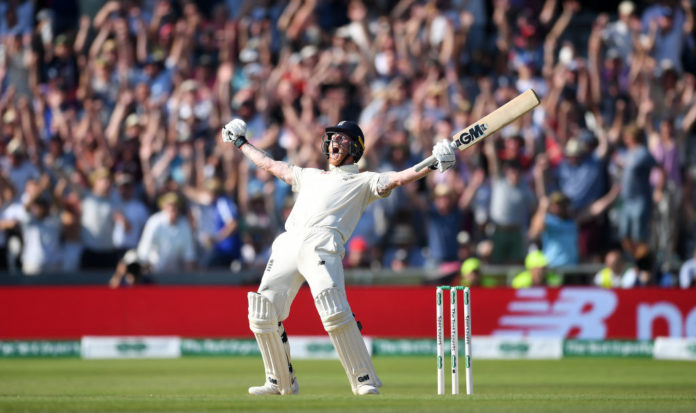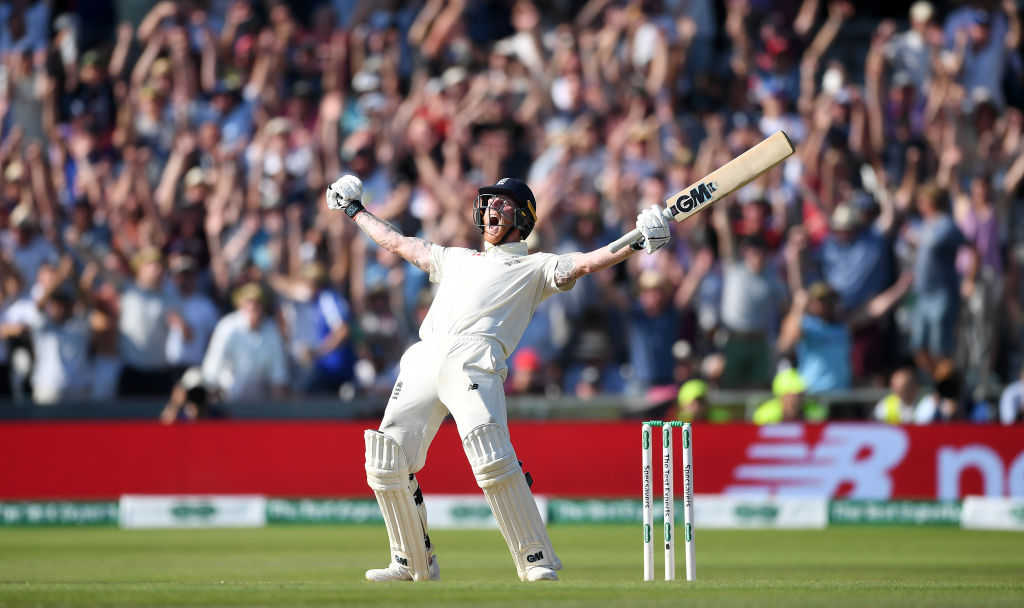

One of cricket's most famous rivalries is set to retake the world stage after nearly a year-and-a-half hiatus. This time around, it's the Australians who will travel overseas, facing the challenge of defending the Ashes on English soil.
Pat Cummins and his men will be faced with a considerable challenge, going up against an English outfit thriving with an aggressive approach to the longest format under the coaching of Brendon McCullum.
In this article, we dive into history and discuss England's most memorable wins against the Aussies.
England vs Australia, The Oval, 1938
The Fifth and final Test of the 1938 Ashes series saw absolute domination by the hosts. England won the game by an innings and 579 runs, the biggest win in test cricket history.
England batted first after winning the toss and piled up a mammoth 903-7 before declaring. English batsman Leonard Hutton racked up a mighty 364, while Maurice Leyland and Joe Hardstaff contributed 187 and 169 respectively.
Australia came out to bat with two players sidelined due to injuries in Sir Don Bradman and Jack Fingleton. Batting with just nine, Australia scored 201 in the first innings and were only able to put up 123 when they were asked to follow on.
English bowlers Bill Bowes and Ken Farnes proved too much of a hindrance to Bradman's men, scalping 12 of the 18 wickets amongst themselves.
Absolute domination in the final Test was not enough for England to reclaim the Ashes, as Australia managed to retain the urn thanks to a prior win in Leeds.
England vs Australia, Headingley, 1981
The Third Test of the 1981 series saw England put up a comeback for the ages to not only win the test match but to win the series and retain the Ashes.
Electing to bat first, Australia scored a mighty 401/9d with fine contributions by John Dyson and skipper Kim Hughes. England bowled for nearly two whole days, with Sir Ian Botham the shining star with the ball in the first innings, finishing with figures of 6/95. England had a fairly poor response with the bat, lasting for just 50 overs as they were bowled out for 174, Botham who was phenomenal with the ball, top scored with a 50.
Confident with the 228-run lead, Hughes asked England to bat again. The hosts had a horror start to the second innings losing half their team for just 105 runs. Botham, the next batsman then went on to put up one of the greatest individual performances in cricket history, crafting a chance for his country in a match that was considered finished at the end of Day Three. Botham smacked the visiting bowlers all around the park, hitting twenty-seven boundaries on his way to his unbeaten 149. Wickets, however, fell at the other end as England were bowled out for 356.
With less than 130 to defend, England had to give their all to seal a famous victory. They did, courtesy of Bob Willis, who picked up 8/43 to whom the Australian batsmen had no answer. The visitors were bowled out for 111, becoming only the second team in history to lose a game after enforcing a follow-on.
Botham was adjudged the Player of the Match, finishing the thrilling Test with 7 wickets and 199 runs, one of the greatest all-round performances ever.
England vs Australia, Headingley, 2019
In a bid to secure supremacy at away from home, Australia travelled to England to compete in one of the most equally balanced Ashes series in recent history.
Headingley, a fabled venue for some of the greatest test matches ever seen, was set to play host for the third test, with Australia entering with a 1-0 lead.
In the first innings, Australia scored only 179 and struggled to show effective batting, apart from David Warner and Marnus Labuschagne, the rest of the team was dismissed for either a duck or a single-digit score. England, favorably on top, came out to bat only to succumb to an unforeseen collapse. Joe Denly top-scored for the hosts, notching just 12 as England was bowled out for a measly 67.
With a lead of 107, the Aussies aimed for a better performance in the first innings, which they did achieve putting up an additional 246 runs, with Labuschagne's well-made 80 of 187 balls.
England came out to bat with a target of 359 to chase. At stumps on Day Three, the Test match was in the balance, with England hanging tough at 156/3.
What happened on day four will be considered one of the greatest individual days of cricket in test history. Ben Stokes took to the Aussie attack smacking them around the park as wickets continued to tumble on the other end. Hope was minimal as England lost Stuart Broad, the penultimate batsman, with 72 runs still to get. Jack Leach then walked out to bat and put up a show of resilience, blocking and defending while Stokes scurried runs together on the other end. Having lost a review opportunity and botching a run-out, Australia piled the pressure on themselves. With just one run to get at the end, Stokes cut Pat Cummins through covers for four, handing England a surprise victory and breaking the record for their highest-ever run chase in tests.
England vs Australia, Trent Bridge, 2015
The Fourth Test of the 2015 Ashes provided England with the opportunity of securing the urn with a game to spare, having already won the First and Third Tests. However, they would have to achieve this without premier bowler James Anderson, who was ruled out due to injury.
On Day One, England captain Alastair Cook put in the Aussies to bat. Just after drinks in the first session, the Australians were bowled out for 60. The innings is still the shortest Test innings in history as it was concluded in just 18.3 overs. Stuart Broad was the kryptonite for the entire Australian side as he picked up eight wickets while conceding just 15 runs. What a game for Broad to step up and his efforts earned him the best bowling figures ever in an Ashes series. England had a fine time at the crease in comparison scoring 391 runs before declaring, Joe Root topping the run-scoring charts with a hard-fought 130.
In a bid to comeback, Australia looked in a good position in the second innings, putting up an opening stand of 113 before Chris Rogers was dismissed by Ben Stokes. With 4 wickets lost in quick succession soon after, the Aussies struggled to keep their wickets and eventually were bowled for 253.
A win for the English meant they won the Ashes, a win earned by an absolute bashing of their bitter rivals.
England vs Australia, Headingley, 2001
The 2001 Ashes series saw Australia dominate England, the visitors were up 3-0 ahead of the Fourth Test. To avoid an embarrassing sweep at the hands of their biggest rivals, the hosts had to step up in a huge clash at Headingley.
Electing to bat first, the Australian contingent continued their fine form. Huge contributions by middle-order batsmen Ricky Ponting (144), Mark Waugh (72), and Damien Martyn (118) ensured the Aussies were on top at the end of their first innings, which concluded at 447. England, in their first innings, responded well with the whole top order chipping into the team total, Alec Stewart top-scored with 76 before the hosts were bowled out for 309.
With a lead of 139 in hand, the Aussies continued racking up runs in their second innings, Ponting looked unstoppable scoring at an aggressive pace. At tea on Day Four, with Australia leading by 315, stand-in skipper Adam Gilchrist decided it was plenty as there was rain on the forecast, declaring on a second innings total of 176/4.
England lost their openers early on day 5, the hope of a win diminishing with every over. However, then came an absolute batting clinic by Mark Butcher. The top-order bat smacked the likes of Shane Warne, Jason Gillespie, Glenn McGrath, and Brett Lee for 23 boundaries en route to restoring belief amongst the English faithful. The aggressive approach was necessary with time and overs running out on the final day of play. Butcher supported by Nasser Hussain and Mark Ramprakash kept the scorers busy as the hosts inched closer to victory. The target was breached in the last hour of play and Butcher finished unbeaten on 173.
Gilchrist termed Butcher's performance as 'one of the great Ashes innings'.
England vs Australia, Edgbaston, 2005
It was the 2005 series that finally saw England lift the Ashes for the first time since the 1986/87 series, a momentous occasion in English cricket history. England lost the First Test comprehensively by 239 runs, in order to come back and give themselves a chance at the urn, something extraordinary was needed, psychologically more than anything, and that is exactly what the second test showcased.
Ricky Ponting won the toss and put the English into bat. The hosts started off extremely well with a 112-run opening stand before Andrew Strauss was bowled by Shane Warne. Fellow opener Marcus Trescothick top-scored with 90, and Kevin Pietersen and Andrew Flintoff chipped in with half-centuries. England was bowled out for 407 at stumps on Day One. In their response, Australia scored 308 aided by the bats of Justin Langer, Ponting, Michael Clarke, and Adam Gilchrist.
With a lead of 99, the English batsmen came out to replicate their efforts of the first innings but found themselves 4/31 in 14 overs after Brett Lee picked up three wickets in 12 minutes. Ian Bell and Kevin Pietersen were soon after dismissed by Warne and England was 5/72. It was Flintoff who then stepped up taking runs off Lee and Michael Kasprowiscz, putting pressure back on the fielding team. Ponting then put the entire field on the boundary line, except the bowler and wicket-keeper and Flintoff proceeded to still smack one over midwicket. Warne then picked up his sixth wicket after he bowled Flintoff to seal the hosts' second innings at 182.
Ponting's men needed 227 runs to win with more than two days left to play. Matthew Hayden and Langer started well scoring at a good pace. It was Flintoff to get the first scalp in the 13th over of the innings. Flintoff then picked up the big wicket of Ponting, as he edged it behind to the wicketkeeper. As time passed, Australia kept ticking towards the total but also lost wickets at regular intervals. When Gilchrist was dismissed for 1 and Gillespie was trapped in front by Flintoff, England was on the brink of victory as Australia needed 146 runs with just three wickets left. But, the game was not over Lee and Warne fought back this time with the bat and scored 40-apiece, restoring Australia's hope to secure a famous victory. With just three runs left to get, Kasprowicz knicked behind off Steve Harmison and Geraint Jones completed a spectacular catch to hand England a win in an absolute thriller. Flintoff won the Player of the <atch for picking up 7 wickets and scoring 125 runs.
Michael Vaughan and his teammates' psychological beliefs changed after this win, the whole team was on a vengeance to play their best cricket in the rest of the series. England managed to win the fourth test, and with the other two test matches drawn England lifted the Ashes after 18 years.





